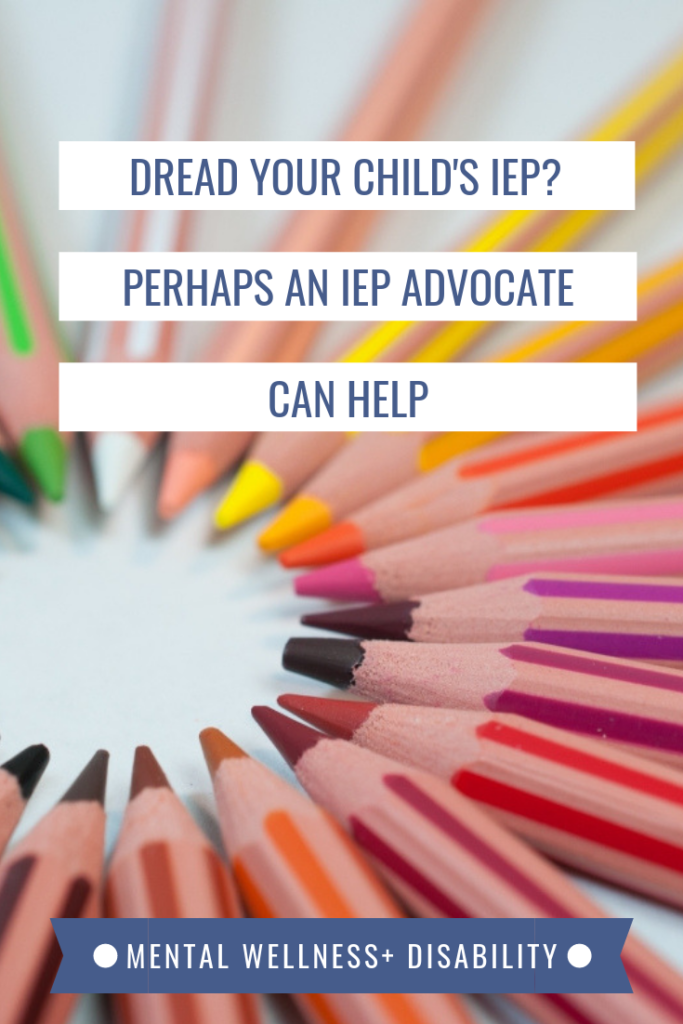IEP’s are a frequent topic when I’m meeting with special needs parents in counseling. I talk with parents all the time who dread attending their child’s IEP. They describe that every IEP meeting leaves them feeling anxious, guilty, and incompetent, or makes them feel like a nag or a broken record.
Today, I’m sharing with you a resource that you may not have heard of, but that might help to make IEP meetings more productive and less overwhelming; an IEP advocate.
An IEP advocate is a person hired by a family to:
- Ensure that their child’s right to FAPE is protected
- Guarantee that all reasonable accommodations that might be beneficial for the child are put in place
- Help a child have a smooth transition out of secondary school and into the workplace or college
Meet IEP Advocate Shannon Bellezza
IEP Advocate Dr. Shannon Bellezza has an impressive resume: She holds a masters degree in Special Education and a Doctorate in Curriculum & Instruction from NC State University. She has a background teaching students with Autism and Intellectual Disabilities. She is currently a Teaching Assistant Professor in the Department of Teacher Education and Learning Sciences at North Carolina State University.
Dr. Bellezza became interested in special education when her younger sister, who had been diagnosed with intellectual disability, was not having her needs met by her school. An undergraduate at the time, Shannon started taking special education classe to learn how to advocate for her sister. Having sat on both sides of the table, Dr. Bellezza has a unique and deep understanding of the IEP and special-education service delivery processes.

My interview with Dr. Shannon Bellezza
Tell us your story, how did you become an educational advocate?
I have a sister who is 11 years younger than me who has an intellectual disability, and I began going to her IEP meetings when she was in elementary school. I was dismayed at the outcomes of those meetings and, since I was an undergraduate at the time, decided to take some psychology and education courses. With what I learned, I became better able to advocate on her behalf, and it’s become a passion of mine.
Talk a little bit about your ideal client; what age and skill ranges benefit the most from working with you?
I wouldn’t say I have an ideal client. The services I provide generally fall into 2 categories:
- IEP/504/school advocacy
- Academic/behavioral coaching
I help parents with children with all types of disabilities with advocacy. My clients range from toddler to adult.
How important is it for a child to have a formal diagnosis for them to work with an IEP advocate?
It’s not. If a student needs an evaluation, I can help parents navigate the system to get the most appropriate evaluation. If they need documentation to support the need for a 504 plan or special education, I can tell them what they need and how to get it.
What kinds of successes do your clients usually experience after working with you?
Improved service delivery at school, better grades, improved work habits, increased academic independence, self-advocacy skills, improved access to education due to the provision of appropriate supports.
If a parent is wondering ‘does my child need an IEP?’, what advice would you give them?
There are 3 gateways to an IEP:
1) a child qualifies as having a disability in one of the areas of eligibility, and
2) the disability has an adverse impact on educational progress, and
3) because of this, the child requires specialized instruction.
To pass through all 3 gateways, there must be documentation or evidence. My advice would be to secure documentation and evidence and then request an IEP.
Is there anything that most parents don’t seem to know about the IEP process that you wish they did?
Don’t trust that the schools know or will do what is best. I frequently find that parents blame themselves for having trusted the school. It’s not the fault of the parents for doing this, but many wish they’d known not to.
In your opinion, what can special needs parents do to have a great relationship with their child’s educators and school administrators?
Be supportive, positive, and maintain frequent contact with those involved in your child’s education. When these methods fail, however, it’s OK to be “that parent” who questions the system and fights for what is right.
How do you maintain a good relationship with the local school systems?
I try not to present problems without solutions. When I go to an IEP or 504 meeting, I bring goals and plans with me. I offer to help school staff in the implementation of any specialized instruction, accommodations, and modifications.
I let the school-based team know that I am part of the student’s team and offer to be of service in any way I can. If things get contentious, I try to bring the focus back to helping the student and solving problems as a team.
What should parents look for in a school/special Ed teacher?
Parents should be mindful of how communicative a teacher is. If a teacher is willing and able to remain in frequent contact with parents, that’s a good thing. If not, the teacher may be overwhelmed by responsibilities, lack appropriate experience and training, or be suffering from burnout.
In the case of less than ideal communication, I would urge parents not to assume the teacher is a bad teacher, but to offer to be of assistance to the teacher. When I was teaching, I found that when my hands were tied by the administration. My students’ parents were my best resource for loosening those ties.
If every parent of a child with disabilities were reading this, what would you want them to know about the transition out of high school?
The earlier you begin planning, the better. Many parents find that the transition component of IEPs do nothing to prepare their children for the transition out of high school. Find out who the district’s transition coordinators are and ask them all the services and agencies that are available to your child.
For people in the Raleigh area wanting to work with you, how can they reach you?
They can reach me through my website at www.tbesolutions.com
Have you used an IEP Advocate, and if so, what was your experience? Do you have questions about IEP Advocacy? Please share in the comments!













